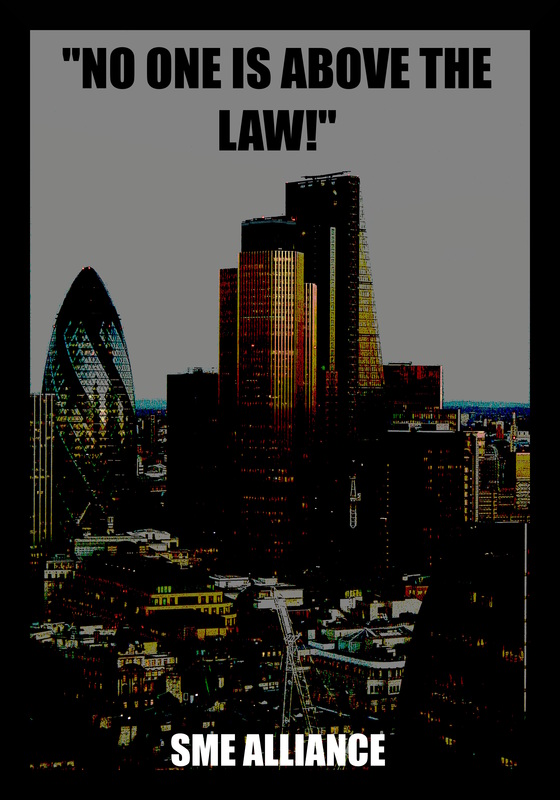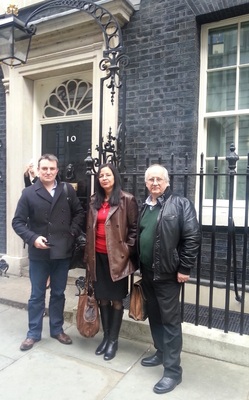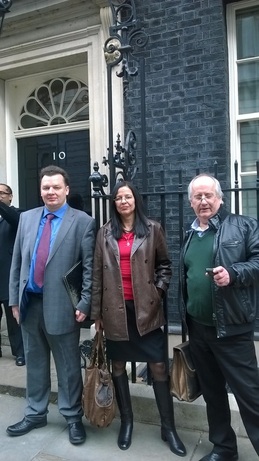|
This is our report to Adrea Leadsom MP following our meeting from the 11th March.
1 Comment
Wednesday we made our second major foray into the political arena when we went to a meeting with Andrea Leadsom and Guto Bebb at Portcullis House. Actually, that’s not quite right because our members seem to be meeting up with politicians on a regular basis at the moment and we seem to be very politically active.
But back to Wednesday – as members will know, we wrote to Ms Leadsom in January requesting a meeting because of what she had said in a Back Bench Debate in December 2014 on the subject of IRHP and the FCA redress scheme. We did discuss IRHP at the meeting but, as I said after the meeting at No 10, I am not really the person to blog on that subject which, I think, remains a contentious issue. However, the overall subject of our meeting and the reason we were there, was to talk about the bigger picture which is – when things go horribly wrong between a bank and an SME client, whether the cause is IRHP, EFG’s, Asset stripping or just sheer bloody mindedness, where do we go? The FOS can only compensate individuals or companies up to £150k and the FCA insist they do not deal with individual cases. So who does Joe or Joanna Blogs Ltd turn to when a bank ruins their business? As things stand, our only real option is civil litigation – which is a perfect situation for banks with deep pockets full of shareholders money and their choice of legal representatives but a total disaster for SMEs. If your business has been damaged or ruined by bank conduct, the one thing you’re unlikely to have is the suitcases full of money needed to take on a big bank in their preferred arena. And now that Court fees are increasing, this is becoming an even more untenable situation. This was the case we were making yesterday. And, while I know many SME members are not over enthusiastic about the way our MPs or Ministers have progressed any really meaningful reform of bank conduct (seems to us banks can still stick two fingers up at SMEs and even at our elected representatives) I do think Andrea Leadsom and Guto Bebb really did listen and take on board the dilemma we were high lighting. Andrea Leadsom asked us what we want done to change this situation and our common sense lawyer, Nick Gould, said we want a sort of “FOS Plus.” I say “sort of” because as Jon Welsby pointed out, it takes a different skill set to mediate the problems of companies that have potentially lost millions and the independence (or lack of) of the IP’s and lawyers involved is also part of that pie. However, we have made the point we urgently need an alternative to costly litigation when things go wrong and the point has been accepted. The next step is – we have been asked to prepare a document explaining both the problem and our idea’s or thoughts on a resolution. In other words “What we want.” That is a huge step forward because, if we could be instrumental in affording SMEs that kind of protection, then we would have gone a long way to levelling a very uneven playing field. Of course, in some cases, disputes would still progress to litigation. But the ability to avoid this in the majority of cases might make banks think twice about their conduct to SMEs. And let’s face it, given the size of their legal bills, our suggestion would probably work out cheaper for the banks? Although I can think of a few big law firms who wouldn’t thank us for curtailing their business! Acting for big banks v SMEs has been a very rich gravy train chugging along for years. I am well aware (before someone points out the obvious) many SMEs who have had their cases adjudicated by the FOS or whose businesses have been wrecked by systemic abuse which the FCA can investigate, are not happy with either organisation. Some would say our regulators have a bias towards the big banks or that regulatory capture or political influence makes them ineffectual. So the last thing we want to do is add a third strand to what some would say are totally unsatisfactory organisations. Obviously a lot of thought needs to go into how a potential mediation or alternative dispute resolution process should be structured. Equally obvious, it would have to have serious powers or the banks would just ignore it. All things to be carefully considered – but how good is it we can even start to consider such a thing? I think it’s brilliant. And for any who think this could all come to nothing and may just be pre election posturing. Well who knows? But being a glass half full sort of person I think it can happen if we are determined to make it happen and anyway, this is really about common sense rather than politics. Even politicians can see that! Of course, no one knows which political party or parties will be in power after May 7th. And our point is equally valid for who ever wins the election. All the same we’d like to thank Andrea Leadsom and Guto Bebb for inviting us to meet with them. It was very positive. Also very positive yesterday was the brilliant success of Derek Carlyle in his 7 year battle against RBS. Here’s his story: http://www.heraldscotland.com/mobile/business/company-news/rbs-fails-in-seven-year-pursuit-of-bankrupt-developer.120478917
easily answerable question. Of course, we were told, David Cameron absolutely believes no one is above the law. And I'm sure that is right. If the leader of a democracy thought anything else, we would all, quite frankly, be buggered.
Which is why yesterday's performance by the bosses of HSBC in front of the Public Accounts Committee, was nothing short of obscene. And while our Government and our politicians may believe no one is above the law, the reality is something completely different. As so many of us have known for a long time now, there are people in the financial sector and corporate world who genuinely believe they are above the law – and because no one in authority challenges this premise, to all intents and purposes, they're right. They are above the law and this is a huge problem. I say no one challenges them which is, of course, wrong. Bankers are challenged on their conduct but sadly, it seems, the challengers have no authority to follow through on their findings. In recent weeks, months, even years, various Committees including the Treasury Select Committee, Parliamentary Committee on Banking Standards and the Public Accounts Committee, have challenged the conduct of senior bankers on a regular basis. And yesterday's performance by Margaret Hodge when she questioned Stuart Gulliver, Chris Meares and Rona Fairhead of HSBC, will go down in history as one of the strongest performances yet. Right up there with Andrew Tyrie at his best. But where does it get us? We now know Mr Gulliver had a Swiss bank account with money from who knows where routed through Panama or a Panamanian company, ending up in Switzerland; Mr Meares was sort of responsible for what happened on his watch when he was Group CEO of the Private Banking arm of HSBC, except he isn't responsible for what he didn't (as the boss) actually know was happening and; Rona Fairhead didn't know anything at all about money laundering or tax evasion even although and according to Ms Hodge, she was paid £10,000 a day to know what was going on. But other than the fact they received a severe ear bashing from yesterday's committee and Ms Hodge was taking no prisoners, so there was little chance to explain themselves or retaliate, what difference will that performance make? None of the above is necessarily illegal but, for example and without doubt, money laundering for Mexican drug cartels seems to be above the law – HSBC was fined huge amounts of money for doing so – but someone was actually responsible for these transactions and, surely, the buck stops with the bosses. Unless of course they are prepared to tell us who, other than the bosses, could make the monumental decision it's a good idea to do business with drug dealers? Similarly, organising Swiss bank accounts for clients so they can evade tax, is against the law but apparently above the law. So the little bit of theatre yesterday, embarrassing though it was for the recipients of Margaret Hodge's quite sharp tongue, was actually a very small price to pay when, in reality, someone or, more likely, several people in HSBC have broken the law - but no one will say who? I am well aware of many instances where people in the financial sector have broken the law. I am even more aware banks pay a fortune to big law firms to help them flaunt, abuse or get round the law. And very often, if we were to stick to the strict letter of the law, these actions would fall under the collective heading of “obstructing justice” or “perverting the course of justice.” However, I also know (from my own and from the collective experiences of many SME Alliance members) you can take such allegations to the police and they will invariably tell you “it's a civil matter.” It's not. Fraud, corruption, money laundering, theft (asset stripping), are all criminal offences. Sadly they are all offences banks (or rather their shareholders) have paid huge fines for but they rarely if ever result in anyone going to jail. Unfortunately for Margaret Hodge and despite her fierce performance on the Committee, she also took a bit of a bashing when she was interviewed by Jon Snow on Channel Four news last night. Having established her dissatisfaction with the answers from the HSBC bankers, Jon was quite scathing when he then said: “... But can you see the frustration that this builds up in the populace when they see what's going on in your Committee and they know nothing can be done about it. Nobody in that Bank will be prosecuted. We know that as an absolute fact. Whatever you find, nobody will be prosecuted.” Absolutely right Jon. The populace is incredibly frustrated and in our democratic Country where everyone is apparently equal, I believe we have definitely reached the point where some people are more equal than others. Sound familiar? And while Mark Carney and David Cameron are absolutely sure no one is above the law – I'm not convinced. I don't think Jon Snow is convinced and I'm not sure Margaret Hodge is either, although the politician in her stops her saying so. Here's her interview with Jon Snow: http://www.channel4.com/news/catch-up/ On a more positive note, the members of SME Alliance are 100% sure “no one is above the law” so we're keeping our motto and striving to prove it's true. Many thanks to my daughter Laura who has given us a photograph (which interestingly she took from the balcony of one of our members) and turned it into a poster for us. SME Alliance – No One Is Above The Law. It would make an even better slogan for any and all political parties!
negative side. So anyone not so keen on seeing SME Alliance progress (strangely there are some) or anyone not keen on the idea we can share our views with the Conservative party, could have been obstructive to our meeting. We could easily have had the kind of debate on twitter which hindered any positive communication. That isn't to say we are actively promoting the Tories – but we definitely wanted the chance to express our views to them and others in the political arena. You can't lobby, discuss or share views if you can't meet people. We hope other parties will also want to talk to us. I did manage to talk to many of our members before the meeting so we could get a view of the key issues members wanted to raise but the meeting was set up at quite short notice and it just wasn't possible to phone every member! How the meeting went. The meeting was with Daniel Korski who is the PMs private adviser on SMEs. He's a nice guy and was very easy to talk to – so a very good politician. I won't sugar coat things by saying we agreed with everything he said or that we felt the Government is really aware of some of the issues we raised but that's why we went – to start making them aware and open a dialogue – which we believe we have done. For example, on one of the key issues which has affected many of our members i.e. the mis-selling of derivatives and the difficulties in getting appropriate redress, Jon Welsby has already got back to Daniel with a document laying out our major concerns and pointing out the need for SME representation in finding a solution. I'm sure Jon will elaborate on this in a separate blog. Two things Daniel pointed us in the direction of which SMEs should be aware of are a) the Small Business, Enterprise and Employment Bill: http://www.publications.parliament.uk/pa/bills/lbill/2014-2015/0091/15091.pdf and b) the proposed Small Business Conciliation Service which will be introduced if the Conservatives win the next election: http://www.tax-news.com/news/UK_Tories_Planning_UK_SME_Conciliation_Service____66681.html I haven't read the Bill although I obviously will (280 pages) but, we can only hope it offers real help to SMEs and is neither too complex or technical to be of practical use. We were particularly interested in the idea of a Conciliation Service as this would appear to go some way towards our suggestion that there should be an alternative to costly litigation when things go wrong for SMEs. We have a meeting coming up at BIS and we hope to learn more about this. The points we discussed at the meeting were; Bank misconduct and how it affects SMEs; Failures in regulation and how we fall through the net; Funding – it still isn't working effectively; Insolvency law – friend or foe and; Lack of representation/support for SMEs at Government level – why are SMEs ignored? Obviously a one hour meeting was never going to be enough time to resolve any of those issues. However, our main objective was to introduce SME Alliance, voice some of our concerns and start a dialogue whereby we can follow up in greater detail. We also wanted share our ideas for positive progress for SMEs. I think we achieved all of that although I'm well aware we have a huge mountain to climb before we can ensure the SME sector is given the recognition it deserves. Without doubt, the most important thing about the meeting was the fact it happened! We're a young organisation and in a very short space of time we have been able to shout loud enough for the current Government to want to talk to us. And while both we and Daniel Korski acknowledged the good work done by organisations like the FSB, I think he accepted the point that SME Alliance is SMEs representing SMEs. We're not paid to do what we do and we have a unique insight into running SMEs because we are the people running them. But, until now, we have rarely been the people talking to those who make the policies that affect our businesses. How can that be right? So yesterday was an important day for SME Alliance. We have broken the ice and started to do what we set out to do. As I said, we have a meeting coming up with BIS and, on the back of our letter of 16th January, we also have a meeting with Andrea Leadsom MP and Guto Bebb in the near future. Hopefully we will also get the opportunity to talk to other political parties? After the No 10 meeting I had a very positive meeting at the Metro Bank with Derek Granville who is hosting our meeting on 31st March. Interestingly I got the impression while at No 10 and while we were discussing funding issues that the Government is very aware of how important Metro Bank and other new players in the banking and funding markets are. And, as the word spreads about these alternative and more ethical funding solutions, I find it strange the big banks can't see what a huge opportunity they are missing by their lack of support for SMEs and their continued intransigence over resolving legacy issues. I did make the point to Daniel Korski, besides the obvious need to talk to politicians, the people SME Alliance also really need to be talking to are the Bank CEOs. That is not as far fetched a suggestion as it sounds. As Nick Gould, our Co-founder and common sense lawyer says – let's break down the silo's and get rid of the 'them and us' scenario we have in the UK, in that way everyone should benefit.
|
Archives
November 2021
|




 RSS Feed
RSS Feed